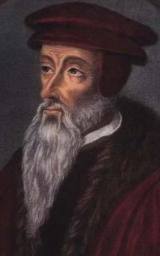the wife of one of the more important leaders of the Protestant Reformation in France. She had recently recovered from a struggle with numerous physical afflictions. In direct reference to her diseases, and all of ours as well, Calvin said:
“They [that is, our physical afflictions and diseases] should, moreover, serve us for medicines to purge us from worldly affections, and retrench [i.e., remove] what is superfluous in us, and since they are to us the messengers of death, we ought to learn to have one foot raised to take our departure when it shall please God” (John Calvin, Selected Works, Vol. 7; 1551; ed. H. Beveridge and J. Bonnet [Grand Rapids: Baker, 1983], 331ff.; emphasis mine).
We ought to learn from our physical afflictions, said Calvin, to live every day with “one foot raised” to take our departure into heaven when it shall please God. Do we live every day with one foot lifted ever so deftly off the ground in constant alert and anxious expectation of the moment when we will depart this world and enter into the splendor of heaven and the presence of God himself? I strongly suspect that Calvin did, and that there is much about living now in expectation of that day that we can learn from him.
Calvin is a remarkably helpful guide, a man of great wisdom, insight, and personal energy when it comes to thinking about the resurrection of the body and our anticipation of eternal life in the New Heavens and New Earth. We see this in no fewer than four ways.
First, Calvin was in the truest sense of the term a pilgrim on this earth. Calvin knew from personal experience what it meant to be a sojourner and an exile in this life. In his commentary on 1 Peter 2:11, Calvin describes the children of God, “wherever they may be, as “only guests in this world” (Commentaries on the Catholic Epistles, translated and edited by the Rev. John Owen [Grand Rapids: Baker Book House, 2005], Vol. 22, p. 78). As he reflected on Paul’s exhortation in Colossians 3:1 that we “seek the things that are above,” he argued that only in doing so shall we embrace our identity as “sojourners in this world,” that is to say, people who “are not bound to it” (Commentaries on The Epistles of Paul the Apostle to The Philippians, Colossians, and Thessalonians, translated by the Rev. John Pringle [Grand Rapids: Baker Book House, 2005], Vol. 21, p. 205).
Nowhere does this emphasis in Calvin come out with greater clarity than in his comments on Hebrews 11 and 13. Calvin concludes from 11:16, where the author mentions the patriarchs’ “desire” for “a better country, that is, a heavenly one,” “that there is no place for us among God’s children, except we renounce the world, and that there will be for us no inheritance in heaven, except we become pilgrims on earth” (Commentary on The Epistle of Paul the Apostle to the Hebrews, translated by the Rev. John Owen [Grand Rapids: Baker Book House, 2005], vol. 22, p. 285 [yes, Calvin believed Paul wrote Hebrews]). His observations on 13:14 are especially instructive. There the author of Hebrews describes the perspective of all believers in saying: “For here [i.e., on this earth] we have no lasting city, but we seek the city that is to come.” In light of this, says Calvin, we should consider that
“we have no fixed residence but in heaven. Whenever, therefore, we are driven from place to place, or whenever any change happens to us, let us think of what the Apostle teaches us here, that we have no certain abode on earth, for heaven is our inheritance; and when more and more tried, let us ever prepare ourselves for our last end; for they who enjoy a very quiet life commonly imagine that they have a rest in this world: it is hence profitable for us, who are prone to this kind of sloth, to be often tossed here and there, that we who are too much inclined to look on things below, may learn to turn our eyes up to heaven” (ibid., 349).
This keen sense of being a pilgrim and sojourner on earth was reinforced in Calvin’s heart by the harsh realities of his life. Forced to flee Paris because of his inflammatory remarks about the Roman Catholic Church and the need for reform, Calvin is reported to have descended from a window by means of bed-sheets and escaped from the city disguised as a vine-dresser with a hoe upon his shoulder. The next two years were spent as a wandering student and evangelist. He settled in Basel, hoping to spend his life in quiet study. Calvin returned to Paris in 1536 to settle some old financial matters. He decided to go from there to Strasbourg to be a scholar, but as a result of his famous encounter with William Farel ended up in Geneva. Trouble erupted when he and Farel sought to administer church discipline and to restrict access to the Lord’s Table to those who were spiritually qualified. The two were literally kicked out of town in April of 1538. Continue reading

 In the 1550s the population of Geneva doubled as refugees, many of them from France, poured in. Many of them sat under Calvin’s preaching five times each week.
In the 1550s the population of Geneva doubled as refugees, many of them from France, poured in. Many of them sat under Calvin’s preaching five times each week.